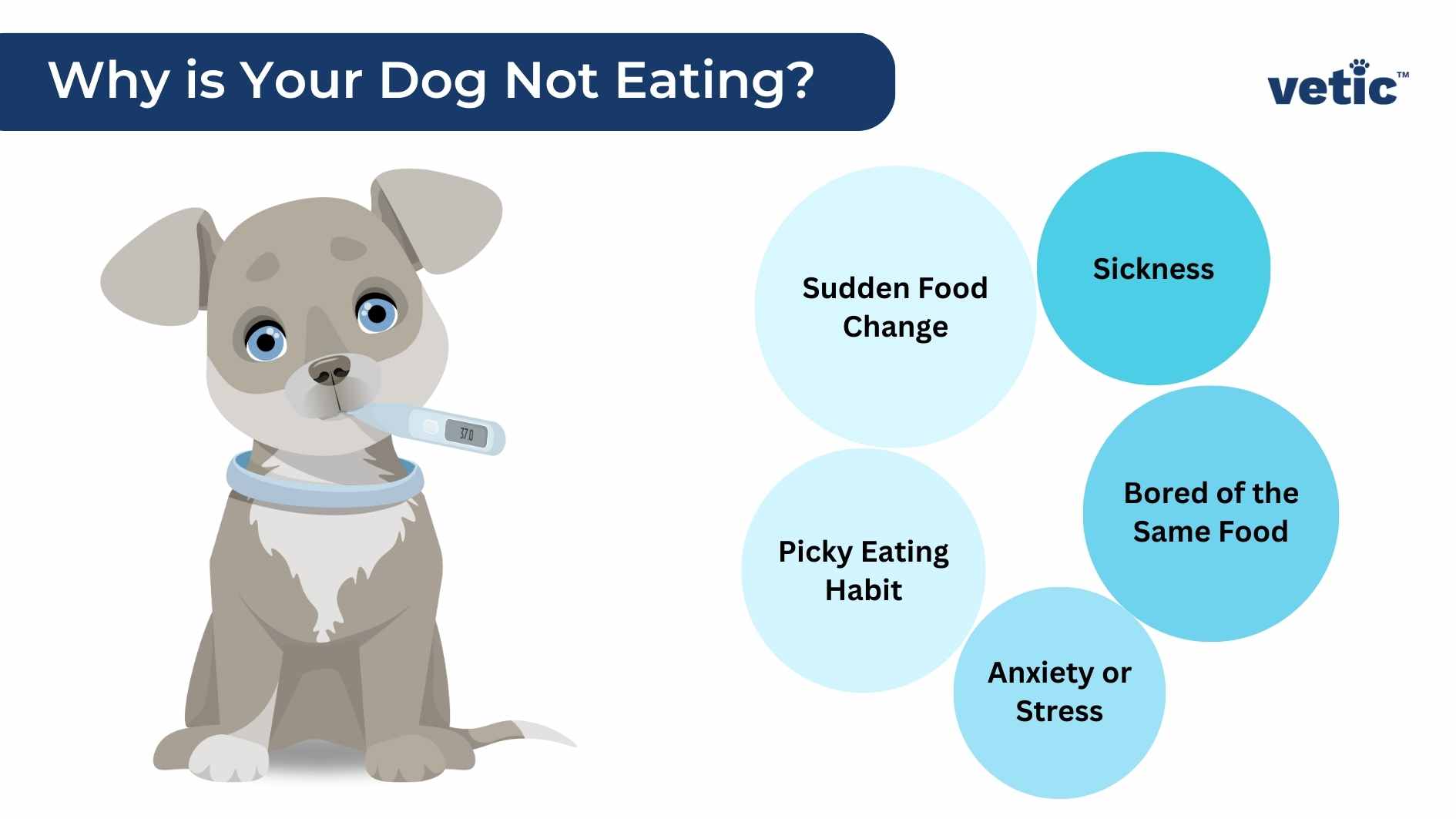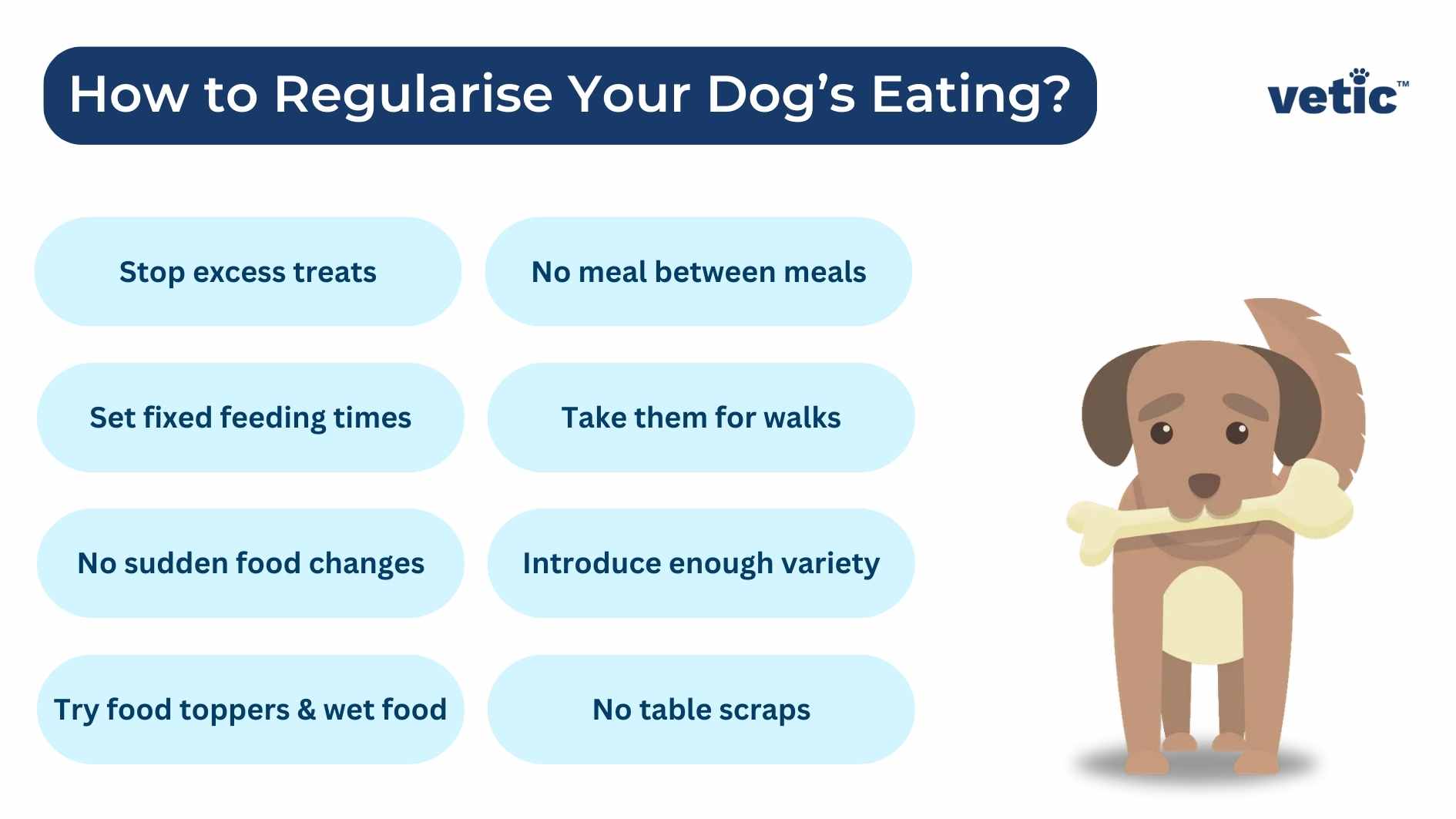“Why is my dog not eating” – it is a critical question many dog parents have asked at least once throughout their time raising a pup.
The most common misconception is, hunger in dogs is similar to hunger in humans. And it’s okay since sometimes we do not feel like eating. In reality, it’s not okay for dogs to not eat for long periods of time.
Dog not eating: why is it a serious issue?
Any dog’s appetite is influenced by a mechanism involving their brain, the feeling of fullness, multiple hormones, and the stomach’s distension rate. So, if they have been munching on little treats throughout the day and then refusing to eat dinner, it’s explainable. However, if they refuse to eat for long hours without any such cause, it’s always a cause for concern.
Loss of appetite or anorexia (not the same as anorexia in humans) in dogs is almost always a sign of discomfort or disease. If your dog hasn’t eaten in the past 24 hours, it’s time to call the veterinarian.
Why is your dog not eating?
It is always safe to take your dog to the veterinarian if it hasn’t eaten for a whole day. The longer you wait, the higher its chances of becoming dehydrated!
Your veterinarian may be the best person to tell you exactly why your dog isn’t eating. We can give you some of the common reasons why most dogs stop eating or lose appetite suddenly.

They are sick
Now, the sickness can involve anything from gastric distension and acid reflux, to CIRDC (Canine Infectious Respiratory Disease Complex) and severe dental issues. Your dog may show other symptoms along with loss of appetite, such as – coughing, sneezing, vomiting, dry heaving, abdominal distension (bloat), diarrhea, hypersalivation, and lethargy.
If you notice any of these symptoms along with anorexia in dogs you should immediately contact your veterinarian without waiting for 24 hours.
They do not like the new food you have given them
Dogs do not like sudden changes in their food. If you have completely changed your dog’s diet from chicken and rice to dry food, they may refuse it entirely.
You can try mixing their old food with the new one. If they still refuse, talk to your vet about a new diet plan.
They are experiencing anxiety or stress
Just like humans, dogs feel less hunger when they experience stress or anxiety. Stress can come from changes in their environment such as the inclusion of a new pet or the departure of a family member.
Similarly, fireworks and loud celebrations can affect your dog’s appetite adversely. If your dog is not eating due to loud noises or commotion, wait until the ruckus is over and approach them with their favorite treats. You can also refer to our blog on how to reduce anxiety in dogs so they resume normal daily activities.
They are picky eaters and they don’t like the same food every day
Some dog breeds are pickier than others when it comes to food. Some examples of picky eater breeds include, Shih Tzu, Pomeranian, Indian Spitz, Dachshund, Greyhound, French Bulldog, Poodle, and Cocker Spaniel are some of the pickiest eaters in the canine world.
Try to use tasty toppers for their food if their daily activities and energy levels remain unchanged. Additionally, speak to your veterinarian about variations in dog food that you can introduce to your dog’s daily diet.
Your dog has been vaccinated today/yesterday
Many times, dogs may feel lethargic or even feverish after they receive a vaccine. Whether it is a new vaccine or their yearly boosters, your dog may not eat for a while after their vaccination.
A dog not eating immediately after receiving a vaccine is common. However, if their loss of appetite lasts longer than 24 hours, you must speak to your veterinarian.
These are some of the most broad reasons why your dog isn’t eating. We can’t say exactly what the cause might be since determining the exact cause will require their physical examination and, sometimes, radiography (USG and X-ray).
What can you do about your dog not eating?

When you first figure out that your dog isn’t eating, obviously try their favorite treats.
If that doesn’t work, try simple boiled chicken without any condiments.
If that doesn’t work, you know it’s time to visit the veterinarian. Now, we know you might feel tempted to just call the vet after a long and busy day, but remember that not all issues can be solved over a phone call.
The veterinarian needs to check your dog’s vital signs to figure out if it’s a dental problem, gastric issue, or the onset of a more serious viral disease.
Always remember, do not try to force your dog to eat by almost starving them. Do not keep waiting with the idea that they will ultimately eat when they are truly hungry.
While it is indeed a possibility that your dog is a super picky eater. It is also true that there is no point in risking dehydration trying to get them to eat “naturally”.
How to make sure your dog keeps eating regularly?

This question is quite tricky and the answer definitely isn’t simple. You may want to sit down with a notepad for this one.
- Stop giving them too many treats at odd times throughout the day.
- Fix particular feeding times. Leave the food out for 30 minutes at a time.
- Take them out for walks before and after meals.
- Do not make sudden changes to their food.
- Do not switch out their old food and water bowls suddenly.
- Opt for nutritional toppers and wet food to add some flavor to your dog’s dry food.
- Stop feeding them table scraps or food from your plate during your meal times.
Can you stimulate your dog’s appetite?
We would recommend regular walks and cutting down on treats if your dog is drinking normally and otherwise energetic/healthy. However, there are medical conditions that require appetite stimulants and other medication.
These medicines should NEVER be given or adjusted without the veterinarian’s consent.
There are multiple appetite stimulants available on the market, but these are reserved for severe cases of anorexia in dogs caused by chronic conditions such as Addison’s disease, viral infections, post-surgery recovery, cancer and cancer treatment.
Your puppy isn’t eating: What should you do?
Call the veterinarian. Immediately!
While adult dogs can wait 24 hours or so before seeing the doctor, puppies absolutely cannot. They dehydrate and run out of nutrients much faster than full-sized dogs. They are also eager to eat.
So, if your pup skips even one meal, it’s cause for concern.
Is it normal for dogs to not eat periodically?
Absolutely not! Just like you, they should be eating regularly at regular intervals. They may have varying appetites due to stress, anxiety, medication, or changes at home. However, it is not at all normal for any dog to stop eating altogether for 24 hours and then resume eating again.
If that is the case with your dog, you should consider that they might have an underlying health condition causing the loss of appetite.
